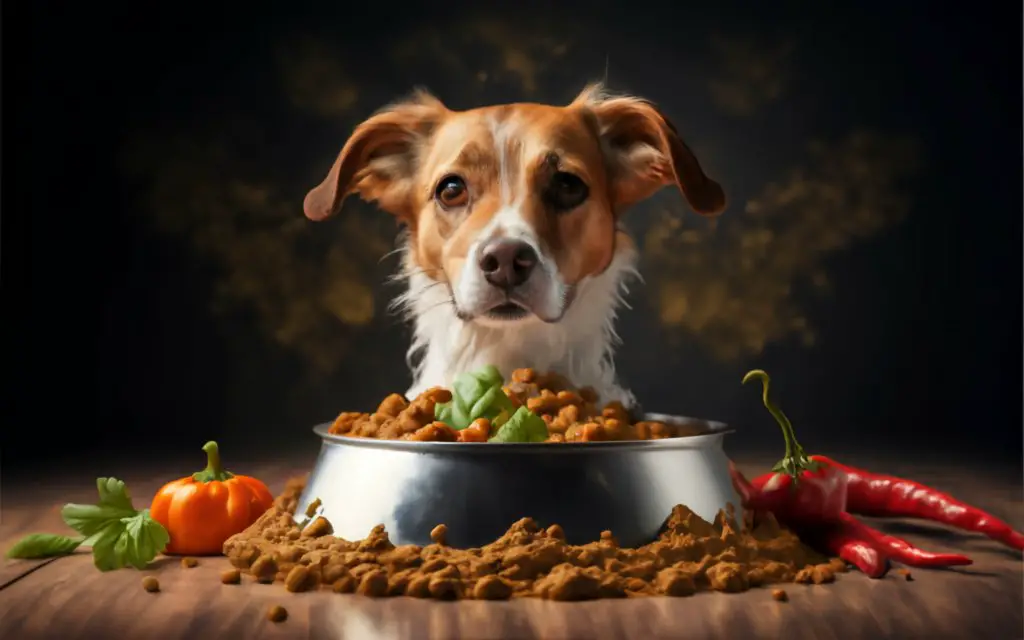Introduction
Curry, a flavorful dish celebrated for its aromatic spices and bold taste, is a favorite in many cuisines worldwide, especially in Indian and Southeast Asian cultures. However, as a pet owner, you might ask, can dogs eat curry? This article explores whether dogs can eat curry, its ingredients, potential benefits and risks, and safer alternatives to ensure your furry friend stays healthy.
Can dogs eat curry?
No, dogs should not eat curry. It often contains spices like garlic, onions, and chili, which can be harmful and toxic to dogs.
What is Curry?
Curry is not a single dish but a category of dishes that often include a combination of spices, herbs, vegetables, and proteins. Here’s a deeper dive into its components:
- Spices: The backbone of curry, spices like turmeric, cumin, coriander, chili powder, and fenugreek provide rich flavors and health benefits. Turmeric, for instance, is known for its anti-inflammatory properties, while chili adds heat.
- Main Ingredients: Curries can feature various main ingredients, including:
- Proteins: Common choices are chicken, lamb, beef, goat, fish, and legumes (like lentils or chickpeas).
- Vegetables: Common additions include potatoes, peas, carrots, bell peppers, and spinach, which contribute vitamins and minerals.
- Curry Types: There are numerous types of curry, including:
- Indian Curry: Rich and diverse, ranging from creamy butter chicken to spicy vindaloo.
- Thai Curry: Often coconut-based and includes ingredients like lemongrass and kaffir lime leaves.
- Japanese Curry: Usually sweeter and thicker, often served with rice.
- Cooking Methods: Curries are typically simmered to meld the flavors, but some may be grilled or baked, depending on the recipe.

Can Dogs Eat Curry?
While certain ingredients in curry might be safe for dogs, the dish as a whole is generally not suitable. Here’s why:
Is Curry Good for Dogs?
Certain components of curry can offer health benefits:
- Turmeric: Contains curcumin, an anti-inflammatory compound. It may help reduce joint pain and improve overall health in dogs, especially older dogs.
- Ginger: Known for its ability to soothe digestive issues, ginger can help alleviate nausea and motion sickness in dogs.
However, these benefits are largely dependent on the quantity and preparation. Curry should never be a regular part of a dog’s diet due to the other harmful ingredients often found in the dish.
Is Curry Bad for Dogs?
Curry can be harmful for several reasons:
- Toxic Ingredients: Many curries contain garlic and onion, both of which are toxic to dogs. Even small amounts can lead to severe health issues, including hemolytic anemia, where red blood cells are damaged.
- High Fat and Salt Content: Curries are often made with fatty cuts of meat and high levels of salt, which can lead to pancreatitis and dehydration in dogs.
- Spices: Spicy ingredients can irritate a dog’s stomach, leading to vomiting or diarrhea.
- Potential Allergens: Some dogs may have sensitivities or allergies to certain spices or ingredients commonly found in curry.
Benefits of Curry for Dogs
Although it’s not advisable to feed your dog curry directly, some ingredients can provide benefits:
- Anti-inflammatory Properties: Turmeric can help with inflammation, benefiting dogs suffering from arthritis or joint pain.
- Digestive Aid: Ginger can promote healthy digestion and ease stomach upset, making it a beneficial ingredient in moderation.
- Nutrient Variety: When made with dog-safe ingredients, curry can contribute to your dog’s nutritional intake, adding vitamins from vegetables and protein from meats.

Risks of Curry for Dogs
Feeding curry to dogs comes with significant risks:
- Toxicity from Garlic and Onion: These ingredients can cause serious health problems in dogs. Symptoms of garlic or onion toxicity include vomiting, diarrhea, lethargy, and more severe symptoms like jaundice and collapse.
- Gastrointestinal Disturbances: Spicy and rich foods can lead to gastrointestinal upset, resulting in vomiting, diarrhea, and discomfort.
- High Caloric Content: The high fat and sodium content in many curry dishes can contribute to obesity and other health issues, such as heart disease and pancreatitis.
- Allergic Reactions: Dogs can have allergic reactions to specific spices, which may cause itching, swelling, or gastrointestinal issues.
Alternatives to Curry for Dogs
If you want to give your dog a special meal without the risks associated with curry, consider these alternatives:
- Homemade Dog-Friendly Stews: Use lean meats, dog-safe vegetables, and low-sodium broth to create a wholesome meal. For example:
- Chicken and Vegetable Stew: Boil chicken breast with carrots, peas, and sweet potatoes in low-sodium chicken broth.
- Plain Cooked Meat: Offer your dog boiled or baked chicken, turkey, or fish without any seasoning.
- Steamed Vegetables: Vegetables such as carrots, green beans, and broccoli can be steamed and served as healthy treats.
- Plain Rice or Quinoa: Cooked plain rice or quinoa is a great option for a healthy base, providing carbohydrates without the risks associated with curry.
Table of Nutrition of Curry for Dogs
Here’s a breakdown of common curry ingredients and their nutritional value, focusing on their potential benefits and risks for dogs:
| Ingredient | Nutritional Benefit | Risk for Dogs |
| Turmeric | Anti-inflammatory, rich in antioxidants | None in moderation |
| Ginger | Digestive aid, nausea relief | None in moderation |
| Garlic | None | Toxic, can cause anemia |
| Onion | None | Toxic, can cause anemia |
| Coconut Milk | Healthy fats (in moderation) | High in calories |
| Salt | Flavor | Risk of dehydration and toxicity |
| Chili Peppers | None | Can cause irritation and pain |
| Vegetables | Vitamins and minerals | Some may be harmful (e.g., onion) |
Pros
Cons
Can Dogs Eat Specific Curry Dishes?
Can Dogs Eat Curry Chicken?
No. Curry chicken typically contains garlic, onions, and various spices that can harm dogs. Even if the chicken is plain, the sauce can be dangerous.
Can Dogs Eat Curry Sauce?
No. Most curry sauces contain harmful ingredients such as garlic and high levels of salt, making them unsafe for dogs.

Can Dogs Eat Curry Spice?
No. Most curry spices, especially those containing chili or garlic, are not safe for dogs and can cause gastrointestinal distress.
Can Dogs Eat Curry Powder?
No. Curry powder contains a mix of spices that can be harmful, especially if they include garlic or other toxic ingredients.
Can Dogs Eat Curry Leaves?
Yes, in moderation. Curry leaves are generally safe for dogs, but they should be introduced slowly and not in large quantities.
Can Dogs Eat Curry Goat?
No. Like curry chicken, curry goat usually contains harmful spices and ingredients that are not suitable for dogs.
What Should I Do If My Dog Eats Curry?
If your dog accidentally consumes curry, watch for symptoms such as:
- Vomiting
- Diarrhea
- Lethargy
- Abdominal pain
If you notice any of these signs, contact your veterinarian immediately for advice and potential treatment.
How to Safely Feed Curry to Dogs?
If you want to create a curry-inspired dish for your dog, follow these guidelines:
- Create a Dog-Friendly Version: Use safe ingredients like lean meats (chicken or turkey) and dog-friendly vegetables (like carrots and peas) without spices. A simple dish might involve cooking chicken with steamed vegetables in low-sodium broth.
- Limit Portions: Even safe ingredients should be given in moderation to prevent digestive upset.
Consult Your Vet: Before introducing any new foods, especially those that might be complex or rich, check with your veterinarian to ensure it is suitable for your dog’s dietary needs.
While curry is a delightful and complex dish for humans, it poses several risks for dogs due to potentially toxic ingredients and high fat and salt content. Although some ingredients in curry may provide health benefits, it’s essential to prioritize your dog’s safety by avoiding curry altogether. Instead, focus on providing safe and nutritious alternatives that can enhance your dog’s diet without the associated risks.





